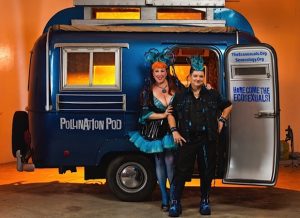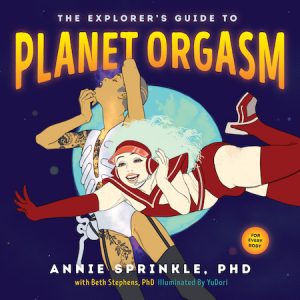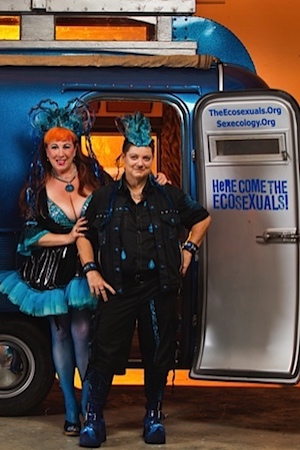Dr. Annie Sprinkle is a national treasure, with a brain and a heart as large and bountiful as other famous bosoms. In these troubled times, we need her more than ever. And as Rome burns, we turn to the goddess to help us discover, or rediscover, one of the most important elements to leading a happy life: Orgasm. Since her new book, The Explorer’s Guide to Planet Orgasm, is all about expanding, redefining, and celebrating that most primal of human forces, I thought I’d pick her brain, and other body parts, about the power and beauty of the orgasm.
Read this interview on the HuffPost.

Annie Sprinkle and Beth Stephens
David Henry Sterry: What was the inspiration for Planet Orgasm?
Annie Sprinkle: Ever since I was in the womb, I have always had a fascination with orgasm. I was born to do this book. Orgasm has been an important part of my adult life, in all kinds of ways. It’s good medicine for me. My orgasms lubricate me through life. Over the years I had written several articles about orgasm, and about twelve years ago, I made a film called Annie Sprinkle’s Amazing World of Orgasm, which was my homage to the Big O. I interviewed twenty-four orgasm experts of all kinds, and I learned a lot from that.
So, when Janet Hardy, the author of the wonderful best selling book, The Ethical Slut, called me and asked me if I wanted to do a new book for her publishing company, Greenery Press, I thought about it for a few days, and thought about what I’d want to do. I kept coming back to the idea of doing a book about orgasm. It’s such a rich, juicy topic.
All my work for the past fifteen years has been with my partner and collaborator Beth Stephens, so I wanted to do the book with her. Janet said “OK, great.” Beth is an artist and professor and my orgasm muse. So we worked on the book together, which was fun. Beth added some good stuff. She’s so creative and very sexual. A double Scorpio. Enough said.
Then I came across a young artist’s paintings on the internet and thought they were really interesting and well done. So I wrote to tell her. YuDori turned out to be a 22-year-old Korean art student that was going to School of Visual Arts in Manhattan, my alma matter. When I asked her if she was interested in collaborating on a book together she got excited. It’s her first book. Everyone loves her illustrations. We didn’t want to make a usual, stereotypical sex education book, but a special book that was also a work of art. Her work is very special. She will go far.
DHS: It feels like in these dangerous times, orgasm is more important than ever. How can we use orgasm to relieve fear and anxiety, and also to inspire us to take action?
AS: Orgasm releases unwanted stress and tension. It brings us back into our bodies when we’ve been watching TV or on the computer. Orgasm helps us feel our feelings. It helps us sleep better after watching the world news. Oy vey. Orgasm puts a bounce in our step. Orgasm connects us to something bigger than ourselves, on a good day. Orgasm is a natural anti-depressant; it’s uplifting. It gets you going when you are down.
However, not all orgasms are healing, inspiring and amazing. Our book also discusses some of the scary aspects of orgasm: orgasms during rape, which is more common than you’d think; orgasm when used as a way of hurting someone else; orgasm that can fuck up your life. That’s what is so fascinating. Orgasm can be dangerous and can cause some physical problems. We include it all, and more.
DHS: Why do you think it’s so difficult for many people in America to have orgasms, or even talk about orgasms for that matter? When did the orgasm get such a bad rap?
AS: Good question. Not all cultures historically felt that way. But in our recent history there is this common belief that if we talk about our orgasms it will take away some of the mystery. I’ve been talking about my orgasms for decades, and the mystery is still there, more than ever. So that’s a fallacy.
However, you can compare orgasm to watching a sunset with your lover. You can enjoy a sunset in silence. Or you can talk about it. If the talking takes away from the experience, then you’re not really throwing yourself into the mystery of the sunset, but distracting each other from the sunset. But if you talk in a way that takes you deeper into the experience, marvel at it together, create some poetic words, talk about the mystery or what you love about the experience… then you enhance the experience.
In general people think orgasm is something we should know automatically how to do, and do well. But we can be taught a lot more about our orgasms. Just like we can be taught how to be more mindful watching a sunset, for example. Learn to focus on circular breathing, imagine opening your heart and becoming the sunset.
As we all know, many people believe sex is bad and dirty. A lot of people have a lot of guilt and shame about sex and their orgasms. Sexual energy is something they want to get rid of, expel, not utilize, build and wallow in. In Planet Orgasm we talk about orgasmic states, extended orgasm… all kinds of orgasms…. nocturnal orgasms, crygasms, breath and energy orgasms, Barbara Carrellas’s gender-free orgasms, Deb Herbenick’s coregasms, and many other kinds.
I had some amazing teachers, who taught me about orgasm, and I’m so grateful to them. I had to seek them out. You won’t see classes on how to have better orgasm at the university, although I have taught some college workshops, come to think of it.
DHS: As a man, I was taught that the whole purpose of sex was for me to have an orgasm, which meant I wanted to get to that ejaculation and shoot the seed, baby…. But you have reclaimed and redefined what the word orgasm means. How do you see this in a larger historical cultural context?
AS: We are all for quickies. Or just shooting the seed, baby. That feels really good! Sometimes that’s what’s desired. But it’s not always the be-all and end-all. There are choices. Often taking more time will generate more powerful orgasms. But there are no absolutes.
Learning orgasm is like learning tennis. To get good at it you need some good instructors, information, techniques, and encouragement to practice. We are orgasm trainers.
Yes, the usual “models of orgasm” define orgasm in terms of blood flow, heart rate, contractions… That thinking is so incredibly limited. So we go out of that box, big time. That’s like saying life is about blood flow, heart rate, and sneezes.

Greenery Press
DHS: What do you want people to take away from your book?
AS: That orgasm is a much more interesting, complex, versatile and useful experience than they ever knew. We also offer seven golden keys to having bigger, better, more badass orgasms. Each key comes with a one-minute experiment so you can experience the effects of each key in a really clear and simple way. For example, you can build a lot of excitement with the mind and use your mind to move that sexual excitement to different parts of your body and have orgasms in different parts of your body.
For the advanced orgasmanaut, we suggest that sex is something much more than bodies coming together. Sex is a frame of mind. Sex is happening all around us all the time, when we look for it.
DHS: What are some simple things we can do to be more in touch with our orgasm?
AS: I’m a big believer in sex education. Read, take classes, look at YouTube videos, and talk with people who are more knowledgeable than you. Orgasm is actually a really big topic. There is a lot of new research being done, which is fascinating. We include some of that in our book.
Modern humans have multiple orgasmic tools and vehicles, ranging from Internet porn to a wide variety of really great sex toys; yet many have little to no experience achieving orgasm. Or big orgasm. More than 10% of women report never having an orgasm, and 8% of men and 33% of women are occasionally unable to reach orgasm. To date, there are no studies about orgasm for trans people.
DHS: How were you educated on sex and sexuality when you were a kid?
AS: Like most people, I first heard about sex on the elementary school playground. I was completely horrified that a penis went in a vagina. Ick. Gross.
At about 11, my parents had some sex ed books on the bookshelf that they expected us to find when we were the age where we’d be interested. They had the Kinsey Reports, The Joy of Sex, The Sensuous Woman, The Sensuous Man, and a few others. So of course I found those books. They were my favorite books, next to E.E. Cummings experimental poetry and the World Book Encyclopedias.
Also, I was raised Unitarian Universalist, so we got some sex education at church, amazingly. We watched a film of a baby being born in church, which left quite an impression.
Also, my parents’ best friends were Vern and Bonnie Bullough, two famous sexologists who wrote sixty-five or so books about sex. We would hang out at their house sometimes, and they had hundreds of books about sex.
My family didn’t really talk about sex. It was hidden. But it wasn’t a big secret either, or a bad thing.
DHS: How did Planet Orgasm become a book?
AS: Beth and I did the text. Then we sent sample illustrations to YuDori to try and explain what we had in mind. Then she sent back the drawings. Then we sent it all to Janet Hardy who did the layout. She sent it to the printer. So I guess we did it the old-fashioned way.
DHS: Who should read Planet Orgasm?
AS: We tried to make Planet Orgasm a book for every body. That was a fun challenge. I think we succeeded pretty well.
DHS: What advice do you have for writers, sex educators, and anyone who’d like to have an orgasm after they read this?
AS: Do it your way. Forget what you know, open your mind, open your legs, breathe a lot more, move more, follow your own muse. Secondly, get yourself a copy of Planet Orgasm. There’s probably a lot more to orgasm than you think.
Annie Sprinkle has passionately researched and explored sexuality for over forty years, sharing her experiences through films, books, articles, and photography. She was the first porn star to earn a Ph.D. and has taught hundreds of sex workshops. Sprinkle has collaborated with Beth Stephens for fifteen years. They are internationally acclaimed artists who create sexually oriented visual art, theater, and performance. They are movers and shakers in the new ecosex movement. She can be found at anniesprinkle.org.
David Henry Sterry is the author of 16 books, a performer, muckraker, educator, activist, and book doctor. His new book Chicken Self:-Portrait of a Man for Rent, 10 Year Anniversary Edition, has been translated into 10 languages. He’s also written Hos, Hookers, Call Girls and Rent Boys: Professionals Writing on Life, Love, Money and Sex, which appeared on the front cover of the Sunday New York Times Book Review. He is a finalist for the Henry Miller Award. He co-authored The Essential Guide to Getting Your Book Published with his wife, and co-founded of The Book Doctors, who have toured the country from Cape Cod to Rural Alaska, Hollywood to Brooklyn, Wichita to Washington helping countless writers get published. He has appeared on, acted with, written for, been employed as, worked and/or presented at: Will Smith, a marriage counselor, Disney screenwriter, Stanford University, National Public Radio, Milton Berle, Huffington Post, a sodajerk, Michael Caine, the Taco Bell chihuahua, Penthouse, the London Times, Edinburgh Fringe Festival, a human guinea pig and Zippy the Chimp. He can be found at davidhenrysterry.com.

